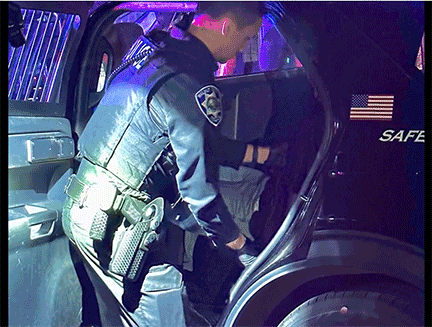An initiative aimed at increasing penalties for drug and theft crimes while reversing parts of Prop 47 is now in circulation.
The move comes after approval by California Secretary of State Shirley Weber said the initiative can now begin collecting signatures—they need to collect signatures of 546,651 registered voters.
This measure will:
- Provide drug and mental health treatment for people who are addicted to hard drugs such as fentanyl, cocaine, heroin, and methamphetamine.
- Add fentanyl to existing laws that prohibit the possession of hard drugs while armed with a loaded firearm.
- Add fentanyl to existing laws that prohibit the trafficking of large quantities of hard drugs.
- Permit judges to use their discretion to _sentence drug dealers to state prison instead of county jail when they are convicted of trafficking hard drugs in large quantities or are armed with a firearm while engaging in drug trafficking.
- W am convicted hard drug dealers and manufacturers that they can be charged with murder if they continue to traffic in hard drugs and someone dies as a result.
- Reinstate penalties for hard drug dealers whose trafficking kills or seriously injures a drug user.
- Increase penalties for people who repeatedly engage in theft.
- Add new laws to address the increasing problem of “smash and grab” thefts that result in significant losses and damage, or that are committed by multiple thieves working together.
- Reducing Homelessness Through Drug and Mental Health Treatment
This proposal takes a modest step in the direction of these states by enacting a new class of crime called a “treatment-mandated felony.” Under this new “treatment-mandated felony,” prosecutors would have the discretion to charge a felony for hard drug possession after two previous drug convictions. If charged with this “treatment-mandated felony” for a third or subsequent drug offense, the offender would be given the option of participating in drug and mental health treatment. If the offender successfully completes drug and mental health treatment, the charge would be fully expunged, and the offender would receive no jail time. If the offender refuses drug and mental health treatment, they would serve jail time for hard drug possession. For a second conviction of the treatment- mandated felony (the 4 th total conviction for hard drug possession), a judge would have the option of imposing time in jail or state prison. Along with hard drug and mental health treatment, offenders charged with a treatment-mandated felony would be offered shelter, job training, and other services designed to break the cycle of addiction and homelessness.
Cracking Down on Hard Drug Dealers
- This Act would authorize greater consequences for hard drug dealers whose trafficking kills or seriously injures a person who uses those drugs, and it would provide a mechanism to warn convicted hard drug dealers and manufacturers that they can be charged with murder if they continue to traffic in hard drugs and someone dies as a result
- This Act would add non-prescription fentanyl to an existing list of hard drugs such as heroin, cocaine, and methamphetamine, for which it is illegal to possess the drug while armed with a loaded firearm
- This Act would also add non-prescription fentanyl to an existing list of hard drugs such as heroin, cocaine, and methamphetamine that authorizes greater consequences for drug dealers who sell large quantities of hard drugs.
- This Act also permits judges to sentence drug dealers who traffic in large quantities of hard drugs or who are armed with a firearm while trafficking in hard drugs to state prison instead of local county jails. Only our state prisons are equipped to manage security for hardened drug dealers and to provide them the rehabilitation services they need to safely re-enter society.
Accountability for Repeat Theft and Smash and Grab Thefts
- Under this Act, an offender with two prior convictions for theft can be charged with a felony, regardless of the value of the stolen property. Diversion programs will continue to exist, meaning that judges will retain discretion not to incarcerate an offender even for more than two theft convictions. But prosecutors will have the ability to bring felony charges against hardened, repeat offenders who continue to engage in theft. Judges will have the discretion to sentence a repeat offender to jail in appropriate cases, or to state prison if an offender is convicted four or more times of theft.
- This Act also authorizes judges to exercise their discretion to impose an enhanced penalty when an offender steals, damages, or destroys property by acting together with two or more offenders or by causing losses of $50,000 or more. By permitting discretion in these scenarios, judges will be able to fashion sentences that are appropriate for the crime committed, including so-called “smash and grabs” committed by mobs or large groups of people working together.
- The value of property stolen in multiple thefts will be permitted to be added together so that in appropriate cases an offender may be charged with felony theft instead of petty theft. This provision addresses the problem of offenders who commit a series of thefts in which the property stolen during each theft has a value under the $950 felony theft threshold, in order to insulate themselves from felony charges.
- Along with the hard drug provisions in this Act, these theft law changes will stop the vicious cycle of hard drug users stealing to support their habits without legal consequences for their actions.
Proposed Initiative Enters Circulation
Allows Felony Charges and Increases Sentences
for Certain Drug and Theft Crimes.
Initiative Statute.
SACRAMENTO, CA – Secretary of State Dr. Shirley N. Weber announced that the proponent of a new initiative (The Homelessness, Drug Addiction, and Theft Reduction Act.) was cleared to begin collecting petition signatures on October 26, 2023.
The Attorney General prepares the legal title and summary that is required to appear on initiative petitions. When the official language is complete, the Attorney General forwards it to the proponent and to the Secretary of State, and the initiative may be circulated for signatures. The Secretary of State then provides a calendar of deadlines to the proponent and to county elections officials. The Attorney General’s official title and summary for the measure is as follows:
ALLOWS FELONY CHARGES AND INCREASES SENTENCES FOR CERTAIN DRUG AND THEFT CRIMES. INITIATIVE STATUTE.
- Allows felony charges for possessing certain drugs, including fentanyl, and for thefts under $950—both currently chargeable only as misdemeanors—with two prior drug or two prior theft convictions, as applicable. Defendants who plead guilty to felony drug possession and complete treatment can have charges dismissed.
- Increases sentences for other specified drug and theft crimes.
- Increased prison sentences may reduce savings that currently fund mental health and drug treatment programs, K-12 schools, and crime victims; any remaining savings may be used for new felony treatment program. Summary of estimate by Legislative Analyst and Director of Finance of fiscal impact on state and local governments: Increased state criminal justice system costs potentially in the hundreds of millions of dollars annually, primarily due to an increase in the state prison population. Some of these costs could be offset by reductions in state spending on local mental health and substance use services, truancy and dropout prevention, and victim services due to requirements in current law. Increased local criminal justice system costs potentially in the tens of millions of dollars annually, primarily due to increased court-related workload and a net increase in the number of people in county jail and under county community supervision. (23-0017A1)
The Secretary of State’s tracking number for this measure is 1959 and the Attorney General’s tracking number is 23-0017A1.
The proponent of the measure, Thomas W. Hiltachk, must collect signatures of 546,651 registered voters (five percent of the total votes cast for governor in the November 2022 general election) in order for the measure to become eligible for the ballot. The proponent has 180 days to circulate petitions for the measure, meaning the signatures must be submitted to county elections officials no later than April 23, 2024. The address for the proponent is 455 Capitol Mall, Suite 600, Sacramento, California 95814. The proponent may also be contacted at (916) 442-7757.
Editors Note
- Initiative No. 23-0017, The Homelessness, Drug Addiction, and Theft Reduction Act. — click here
Related Prop 47 Stories
- April 26, 2023 – Proposition 47 Reform Voted Down by Public Safety Committee
- March 16, 2023 – Antioch Councilmember Defends Proposition 47
- March 11, 2023 – Sacramento County Sheriff Calls Out Walgreens for Not Pressing Charges After Robbery
- March 8, 2023 – Bill to Study Proposition 47 Impacts Moves Forward
- Feb 1, 2023 – Alanis Bill Would Repeal California Proposition 47
- Jan 19, 2023 – Brentwood City Council Supports Petty Theft Bill Aimed to Amend Prop 47
- Dec 15, 2022 – Prop 47 Reform Bill Introduced by Assemblyman Hoover
- Dec 9, 2022 – Bill Seeks to Crack Down on Petty Theft and Shoplifting


4 comments
Seems the motivation behind this initiative is for drug treatment and punishing dealers rather than actually addressing the gapping hole in the law that prop 47 created. Seems the mention of prop 47 is really just an enticement to garner voter attention and signatures.
Finally democrats get around to fixing their grievous blunders
of AB-109 (2011) and Prop 47 (2014).
Democrats short sighted shallow thinkers that they are seem to have no problem experimenting on citizens of California. By the way do not expect an admission they made mistakes or an apology.
ONLY way to stop this insanity is stop electing democrats.
I don’t see enough in this ballot initiative that actually (fully) reverses Prop47. It’s a good beginning but more, needs to be to fully reverse Prop 47. We an initiative in plain language that fully nullifies Prop 47.
These new laws are just going make Jail’s & Prison full over Crowded. Bye putting Homeless behind drug program OR Jail
Is not fixing the problem that everyone needs home. Place to call home , not no institution or jail. I am perfect example, I was there @ one time homeless lost , talking to myself.
I got housed now I work and live in my own home. Everyone should have place that is home. Even our homeless Senior’s.
Comments are closed.